Abstract
Autologous anti-idiotypic responses to tumorspecific lymphocytes altered the capability of mice to reject syngeneic tumors. This was shown by using two non-crossreacting fibrosarcoma lines, 1591 and 1316, induced by ultraviolet light. Cells from these tumor lines are regularly rejected when transplanted into normal syngeneic C3H mice but grow progressively in animals immunosuppressed by irradiation with ultraviolet light or by x-irradiation and thymectomy. Immunization of normal mice with 1591-specific lymphoblasts that had been generated in mixed lymphocyte-tumor cell cultures caused a loss of resistance to 1591 tumor cells, but the animals remained resistant to 1316 tumor cells. In vitro, spleen cells from animals immunized with 1591-specific lymphoblasts did not generate cytolytic T cells to 1591 fibrosarcoma cells, but spleen cells from the same animals responded normally to 1316 fibrosarcoma cells. Furthermore, spleen cells from animals immunized with 1591-specific lymphoblasts contained idiotype-specific T cells that lysed 1591-specific lymphoblasts, whereas 1316-specific lymphoblasts were unaffected. Immunization of normal animals with nonresponding lymphocytes from the same mixed lymphocyte-tumor cell cultures as the 1591-specific lymphoblasts showed normal responses to both tumors in vivo and in vitro. These results suggest that changes in the balance of tumor-specific and anti-idiotypic T lymphocyte clones can influence the capability of an individual to respond effectively to tumor antigens and can determine whether a tumor grows or regresses.
Keywords: T lymphocytes, immune regulation, immunological unresponsiveness
Full text
PDF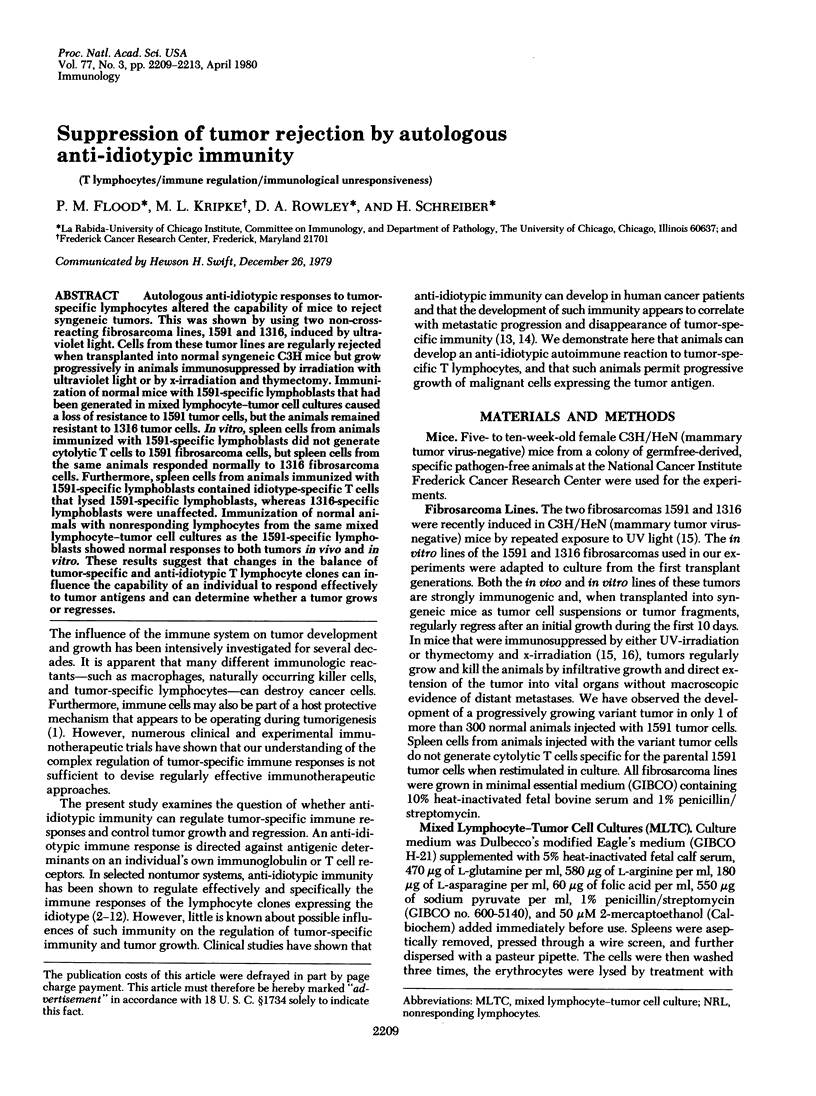
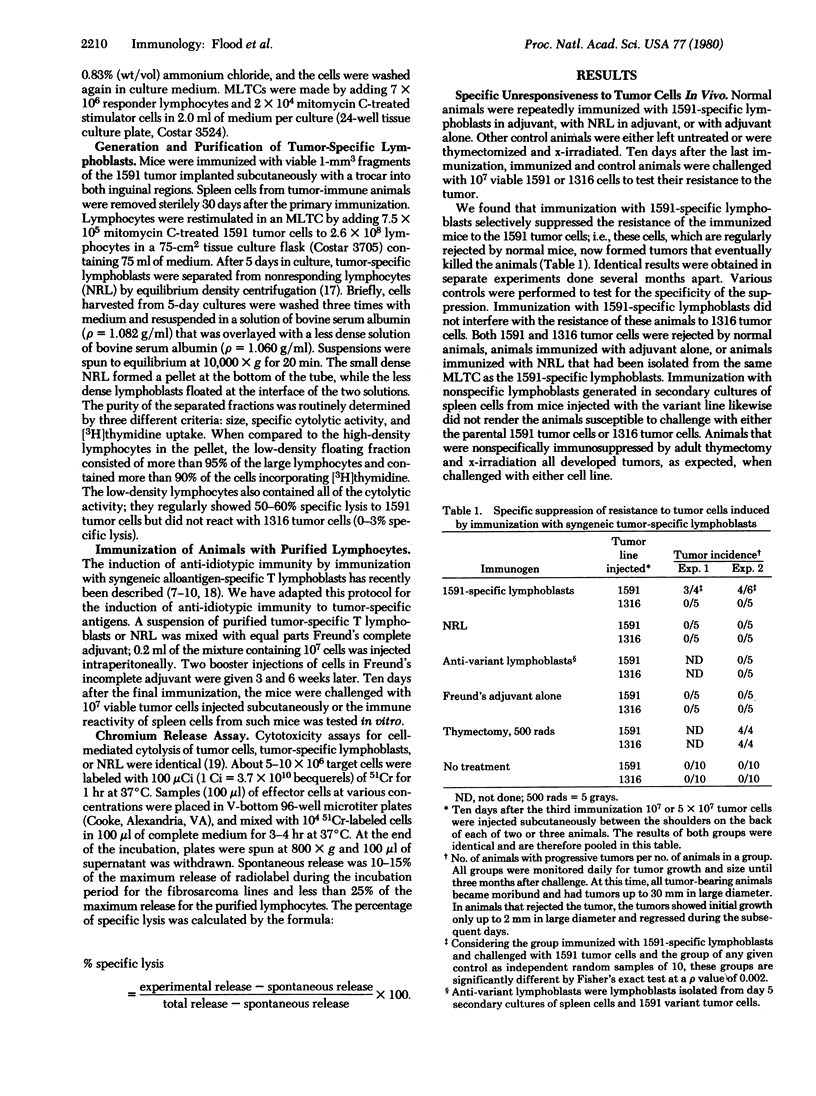
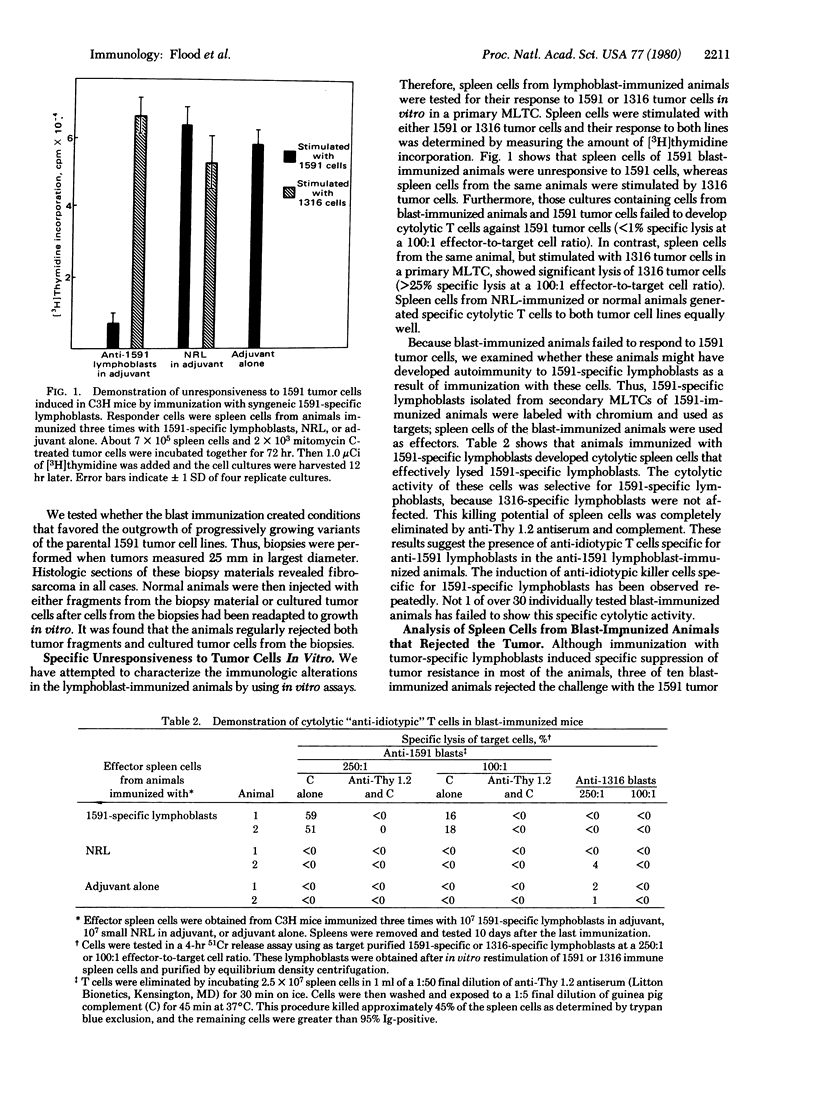
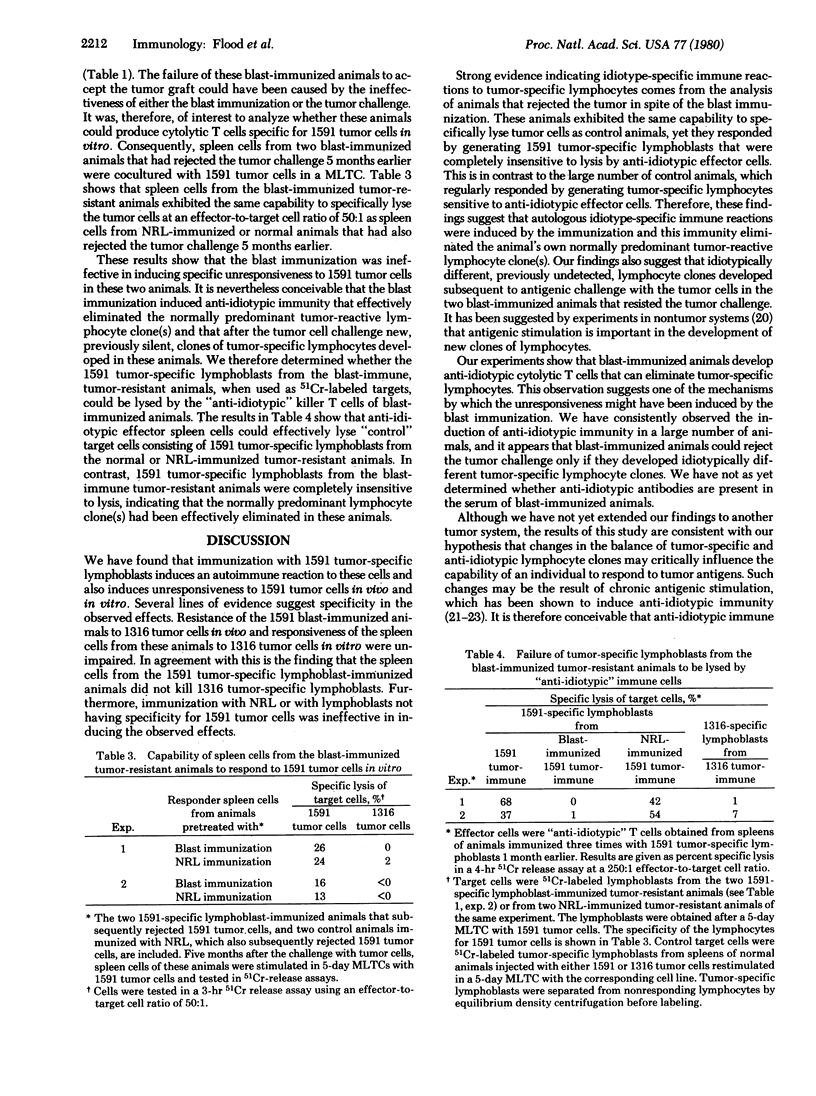
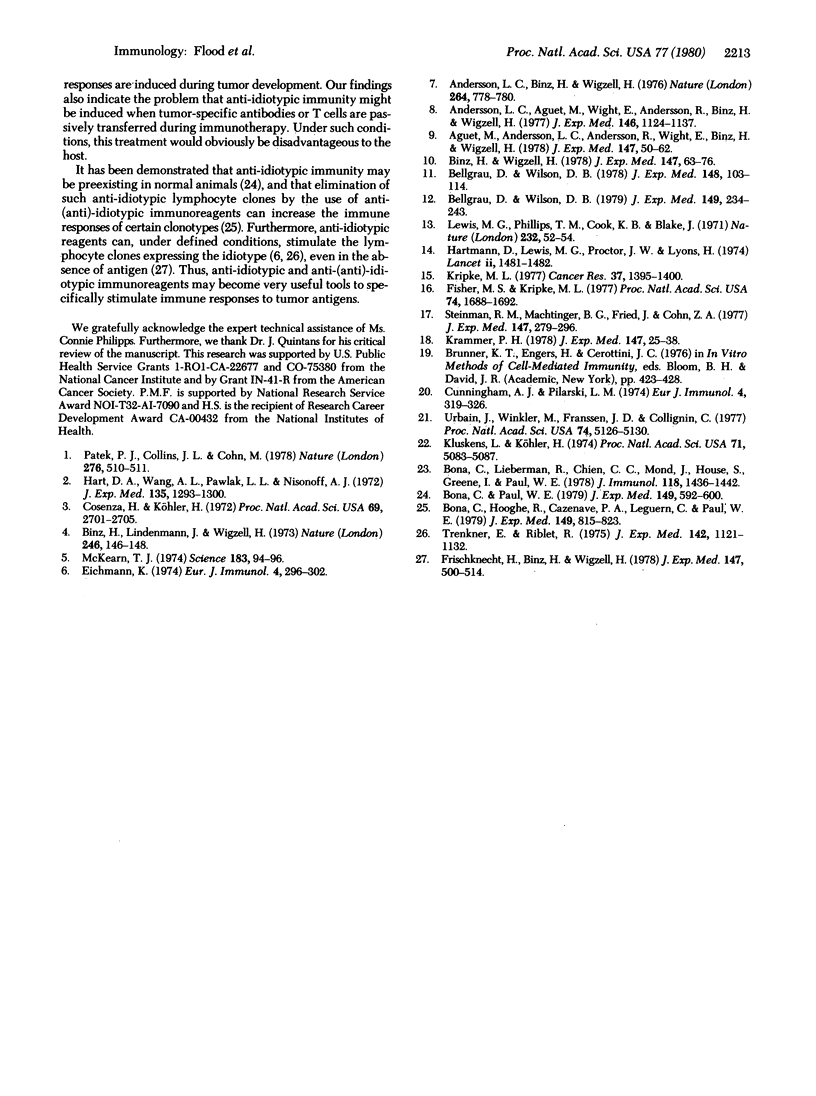
Selected References
These references are in PubMed. This may not be the complete list of references from this article.
- Aguet M., Andersson L. C., Andersson R., Wight E., Binz H., Wigzell H. Induction of specific immune unresponsiveness with purified mixed leukocyte culture-activated T lymphoblasts as autoimmunogen. II. An analysis of the effects measured at the cellular and serological levels. J Exp Med. 1978 Jan 1;147(1):50–61. doi: 10.1084/jem.147.1.50. [DOI] [PMC free article] [PubMed] [Google Scholar]
- Anderson L. C., Binz H., Wigzell H. Specific unresponsiveness to transplantation antigens induced by auto-immunisation with syngeneic, antigen-specific T lymphoblasts. Nature. 1976 Dec 23;264(5588):778–780. doi: 10.1038/264778a0. [DOI] [PubMed] [Google Scholar]
- Andersson L. C., Aguet M., Wight E., Andersson R., Binz H., Wigzell H. Induction of specific immune unresponsiveness using purified mixed leukocyte culture-activated T lymphoblasts as autoimmunogen. I. Demonstration of general validity as to species and histocompatibility barriers. J Exp Med. 1977 Oct 1;146(4):1124–1137. doi: 10.1084/jem.146.4.1124. [DOI] [PMC free article] [PubMed] [Google Scholar]
- Bellgrau D., Wilson D. B. Immunological studies of T-cell receptors. I. Specifically induced resistance to graft-versus-host disease in rats mediated by host T-cell immunity to alloreactive parental T cells. J Exp Med. 1978 Jul 1;148(1):103–114. doi: 10.1084/jem.148.1.103. [DOI] [PMC free article] [PubMed] [Google Scholar]
- Bellgrau D., Wilson D. B. Immunological studies of T-cell receptors. II. Limited polymorphism of idiotypic determinants on T-cell receptors specific for major histocompatibility complex alloantigens. J Exp Med. 1979 Jan 1;149(1):234–243. doi: 10.1084/jem.149.1.234. [DOI] [PMC free article] [PubMed] [Google Scholar]
- Binz H., Lindenmann J., Wigzell H. Inhibition of local graft-versus-host reaction by anti-alloantibodies. Nature. 1973 Nov 16;246(5429):146–148. doi: 10.1038/246146a0. [DOI] [PubMed] [Google Scholar]
- Binz H., Wigzell H. Induction of specific immune unresponsiveness with purified mixed leukocyte culture-activated T lymphoblasts as autoimmunogen. III. Proof for the existence of autoanti-idiotypic killer T cells and transfer of suppression to normal syngeneic recipients by T or B lymphocytes. J Exp Med. 1978 Jan 1;147(1):63–76. doi: 10.1084/jem.147.1.63. [DOI] [PMC free article] [PubMed] [Google Scholar]
- Bona C., Hooghe R., Cazenave P. A., Leguérn C., Paul W. E. Cellular basis of regulation of expression of idiotype. II. Immunity to anti-MOPC-460 idiotype antibodies increases the level of anti-trinitrophenyl antibodies bearing 460 idiotypes. J Exp Med. 1979 Apr 1;149(4):815–823. doi: 10.1084/jem.149.4.815. [DOI] [PMC free article] [PubMed] [Google Scholar]
- Bona C., Lieberman R., Chien C. C., Mond J., House S., Green I., Paul W. E. Immune response to levan. I. Kinetics and ontogeny of anti-levan and anti-inulin antibody response and of expression of cross-reactive idiotype. J Immunol. 1978 Apr;120(4):1436–1442. [PubMed] [Google Scholar]
- Bona C., Paul W. E. Cellular basis of regulation of expression of idiotype. I. T-suppressor cells specific for MOPC 460 idiotype regulate the expression of cells secreting anti-TNP antibodies bearing 460 idiotype. J Exp Med. 1979 Mar 1;149(3):592–600. doi: 10.1084/jem.149.3.592. [DOI] [PMC free article] [PubMed] [Google Scholar]
- Cosenza H., Köhler H. Specific suppression of the antibody response by antibodies to receptors. Proc Natl Acad Sci U S A. 1972 Sep;69(9):2701–2705. doi: 10.1073/pnas.69.9.2701. [DOI] [PMC free article] [PubMed] [Google Scholar]
- Cunningham A. J., Pilarski L. M. Generation of antibody diversity. I. Kinetics of production of different antibody specificities during the course of an immune response. Eur J Immunol. 1974 May;4(5):319–326. doi: 10.1002/eji.1830040502. [DOI] [PubMed] [Google Scholar]
- Eichmann K. Idiotype suppression. I. Influence of the dose and of the effector functions of anti-idiotypic antibody on the production of an idiotype. Eur J Immunol. 1974 Apr;4(4):296–302. doi: 10.1002/eji.1830040413. [DOI] [PubMed] [Google Scholar]
- Fisher M. S., Kripke M. L. Systemic alteration induced in mice by ultraviolet light irradiation and its relationship to ultraviolet carcinogenesis. Proc Natl Acad Sci U S A. 1977 Apr;74(4):1688–1692. doi: 10.1073/pnas.74.4.1688. [DOI] [PMC free article] [PubMed] [Google Scholar]
- Frischknecht H., Binz H., Wigzell H. Induction of specific transplantation immune reactions using anti-idiotypic antibodies. J Exp Med. 1978 Feb 1;147(2):500–514. doi: 10.1084/jem.147.2.500. [DOI] [PMC free article] [PubMed] [Google Scholar]
- Hart D. A., Wang A. L., Pawlak L. L., Nisonoff A. Suppression of idiotypic specificities in adult mice by administration of antiidiotypic antibody. J Exp Med. 1972 Jun 1;135(6):1293–1300. doi: 10.1084/jem.135.6.1293. [DOI] [PMC free article] [PubMed] [Google Scholar]
- Hartmann D., Lewis M. G., Proctor J. W., Lyons H. In-vitro interactions between antitumour antibodies and anti-antibodies in malignancy. Lancet. 1974 Dec 21;2(7895):1481–1483. doi: 10.1016/s0140-6736(74)90219-0. [DOI] [PubMed] [Google Scholar]
- Kluskens L., Köhler H. Regulation of immune response by autogenous antibody against receptor. Proc Natl Acad Sci U S A. 1974 Dec;71(12):5083–5087. doi: 10.1073/pnas.71.12.5083. [DOI] [PMC free article] [PubMed] [Google Scholar]
- Krammer P. H. Alloantigen receptors on activated T cells in mice. I. Binding of alloantigens and anti-idiotypic antibodies to the same receptors. J Exp Med. 1978 Jan 1;147(1):25–36. doi: 10.1084/jem.147.1.25. [DOI] [PMC free article] [PubMed] [Google Scholar]
- Kripke M. L. Latency, histology, and antigenicity of tumors induced by ultraviolet light in three inbred mouse strains. Cancer Res. 1977 May;37(5):1395–1400. [PubMed] [Google Scholar]
- Lewis M. G., Phillips T. M., Cook K. B., Blake J. Possible explanation for loss of detectable antibody in patients with disseminated malignant melanoma. Nature. 1971 Jul 2;232(5305):52–54. doi: 10.1038/232052a0. [DOI] [PubMed] [Google Scholar]
- McKearn T. J. Antireceptor antiserum causes specific inhibition of reactivity to rat histocompatibility antigens. Science. 1974 Jan 11;183(4120):94–96. doi: 10.1126/science.183.4120.94. [DOI] [PubMed] [Google Scholar]
- Patek P. Q., Collins J. L., Cohn M. Transformed cell lines susceptible or resistant to in vivo surveillance against tumorigenesis. Nature. 1978 Nov 30;276(5687):510–511. doi: 10.1038/276510a0. [DOI] [PubMed] [Google Scholar]
- Steinman R. M., Machtinger B. G., Fried J., Cohn Z. A. Mouse spleen lymphoblasts generated in vitro. Recovery in high yield and purity after floatation in dense bovine plasma albumin solutions. J Exp Med. 1978 Feb 1;147(2):279–296. doi: 10.1084/jem.147.2.279. [DOI] [PMC free article] [PubMed] [Google Scholar]
- Trenkner E., Riblet R. Induction of antiphosphorylcholine antibody formation by anti-idiotypic antibodies. J Exp Med. 1975 Nov 1;142(5):1121–1132. doi: 10.1084/jem.142.5.1121. [DOI] [PMC free article] [PubMed] [Google Scholar]
- Urbain J., Wikler M., Franssen J. D., Collignon C. Idiotypic regulation of the immune system by the induction of antibodies against anti-idiotypic antibodies. Proc Natl Acad Sci U S A. 1977 Nov;74(11):5126–5130. doi: 10.1073/pnas.74.11.5126. [DOI] [PMC free article] [PubMed] [Google Scholar]



